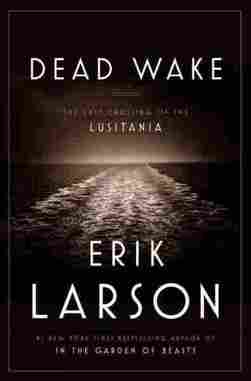 Written by Lauryn Smith I did not think it would be possible, but “Dead Wake” has replaced “The Devil in the White City” as my favorite Erik Larson book. (Can I take a second to brag that my copy of the former is signed by the author?!) If you have not read any of this guy’s books, you need to. Like now. In “Dead Wake,” Larson explores the events during the weeks leading up to the sinking of the luxury ocean liner the Lusitania on May 7, 1915. Many people have heard of this World War I disaster, but few know the minute details, the ill-fated set of conditions that culminated in the deaths of hundreds of passengers. In his characteristic compelling biographical style, Larson educates readers on this maritime catastrophe. First, let’s talk basics. The Lusitania was a Cunard transatlantic liner that navigated between New York City and Liverpool. In response to competition, it was designed in 1907 to be one of the biggest, fastest, most luxurious and most modern ships around. It was the first of Cunard’s “grand trio” of four-funneled ships. This “Greyhound” was cruising from NYC to Liverpool in seas recently declared by Germany to be a war zone when it was attacked by a German U-boat, or submarine. On its final excursion, the Lusitania was captained by William Thomas Turner and contained passengers both regal and humble, as well as numerous children. Remarkably, as Larson demonstrates, the passengers were relatively calm sailing into submarine-infested waters during the tenth month of the war, likely an effect of the widespread expectation that civilian ships were to be kept safe from attack. But as luck would have it (and by luck I mean an array of circumstances that melded juuust so), Unterseeboot-20, the German submarine captained by Walther Schweiger, torpedoed the Lusitania, effectively ending its nautical reign, as well as forcing America’s participation in the war. That summary of the Lusitania is truly just the beginning. It is tempting to detail all the interesting components Larson compiles in his newest nonfiction tale, but not only would that spoil the story, it would take ages. Larson unearths the myriad facets, both large and small, that led to this calamity, and he describes how the interrelation between them resulted in such an outcome. Weather, politics, ship design, cryptanalysis and more—all are important pieces of the story, and Larson presents them eloquently and effortlessly. He paints a vivid picture. Readers will walk away feeling quite familiar with the Lusitania, its history and its peripheral contexts. Larson chose to present the overarching narrative by alternating two discrete storylines and merging them. One gives the background of the Lusitania, the other that of U-20. The back and forth between prey and predator creates tension, tension that escalates with Larson’s depiction of the actual sinking event and its sobering aftermath. The people involved will get under your skin, and their fates just as much so. Be prepared for tons of emotion.
Larson’s research is impeccable. He expertly connects seemingly disparate events and illustrates how they fit together. He also exhibits a firm grasp on nautical terminology, doing well to explain jargon and tricky concepts to readers. His writing style is laudable, as any reader can easily delve into and appreciate his prose. I am amazed by the way in which Larson takes facts and data and transforms them into anecdotes that reads like fiction. In fact, one of my favorite aspects of Larson’s style, which speaks to his background as a journalist, is his exclusive use of quoted dialog, taken from letters, diaries and other documents and correspondences. He makes history come alive. His research is clearly thorough, and the way he processes it is on point. And as is characteristic of Larson’s work, the organization of “Dead Wake” is flawless, as is the balance of the various structural components. Did I mention the characterization? While not as individual-centric as his other novels, “Dead Wake” provides solid depictions of its host of characters. This is perhaps most true when it comes to Captain Turner, the stoic, introverted, lovable man who leads men well and evokes confidence. Other characters, though marginal, are nonetheless distinct and memorable, and they add authenticity to the book. For instance, we learn about the lives of submarine crew members, as well as all that goes along with living in tight quarters with a bunch of other people. Larson even peppers in fun factoids that relate to the characters, such as what a “U-boat baptism” is. Now, I have one caveat. “Dead Wake” may not be a book you can read in one sitting, as it is very dense. But each word, sentence and paragraph is essential and thoughtfully included. All good things take time, right? This is a case in point. Stick with this one to the end, and I promise you will feel gratified. And when Larson finally conveys the definition of “dead wake,” you will get chills. Secrecy, luxury, comedy and tragedy, “Dead Wake” has it all. History buffs and novices alike will surely be glad they read the book. Readers will absolutely walk away with a heightened understanding and appreciation regarding a major part of history. I, for one, learned a lot about Woodrow Wilson and his love life (yes, really), and so much more. Larson admits to having little knowledge of the Lusitania prior to writing “Dead Wake,” but the expertise he developed during the writing process is evident, and his interest contagious. Title: Dead Wake: The Last Crossing of the Lusitania Author: Erik Larson Publisher: Crown Publication date: March 10, 2015 Page count: 430 List price: $28 ISBN: 978-0307408860 Awards: 2015 Goodreads Choice Award for History & Biography; 2015 World Magazine History/Biography Book of the Year
1 Comment
10/16/2017 10:19:37 am
HI Lauryn,
Reply
Your comment will be posted after it is approved.
Leave a Reply. |

Enjoying my book reviews? If you’ve found them helpful or simply love diving into a good book, consider supporting my caffeine-fueled reading sessions! Your contribution helps keep the reviews coming and ensures I stay wide awake for those late-night reading marathons. Cheers to a shared love for literature! ☕️
Categories
All
|
